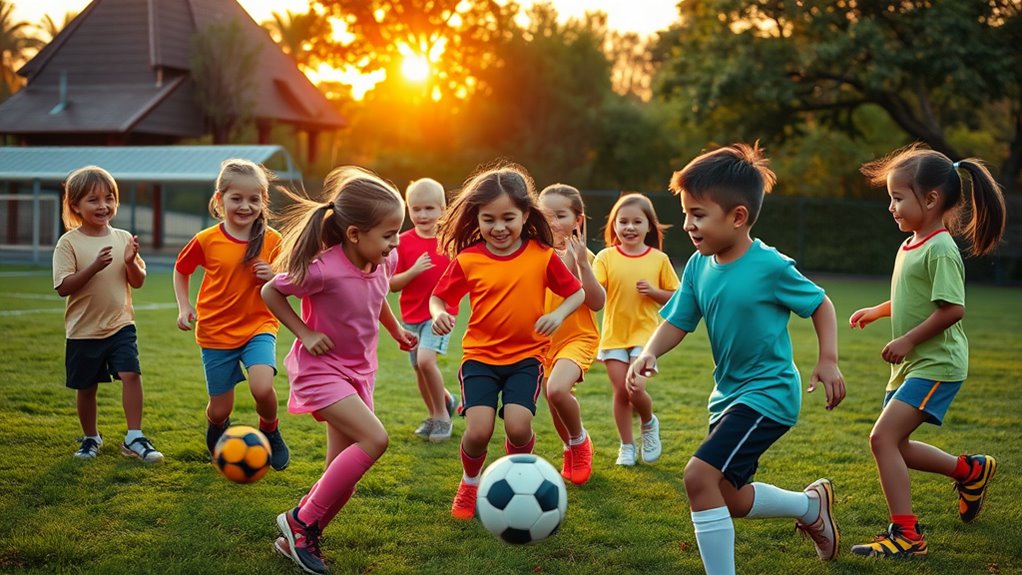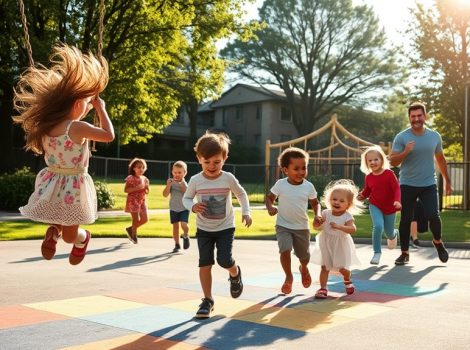The Impact of Sports on Children’s Social Skills
When you think about the role sports play in children’s lives, you might focus on physical skills or competition. However, consider how these activities shape their social development. Participation in team sports fosters teamwork and enhances communication, helping kids navigate friendships and conflicts. They learn to work together and build trust, which can be essential for their overall emotional growth. But what specific benefits do these experiences translate into as they grow older? The answers might surprise you and shed light on the broader implications of sports in shaping social dynamics.
Importance of Social Skills
Social skills are essential for children’s overall development, as they frequently dictate how kids interact with peers and adults alike. Imagine your child trying to make friends at school or chatting with a teacher. If they’ve got solid social skills, they’ll navigate these situations like a pro!
Good social skills help kids express their feelings, share ideas, and show empathy. You know how it feels when someone understands you? That’s what social skills can do! When children learn to listen and communicate, they not only build friendships but also develop trust.
And trust is like the special ingredient in a recipe for great relationships.
Think about it: kids with strong social skills often feel more confident, which makes them more willing to try new things. Whether it’s joining a new club or speaking in front of the class, those skills give them a boost.
Plus, having friends means more fun!
Teamwork Development
Participating in sports offers kids countless opportunities to develop teamwork skills. When you join a team, you quickly learn that success isn’t just about individual talent; it’s about working together. You’ll find yourself passing the ball, cheering your teammates, and celebrating wins as a group. This creates a sense of belonging, which is super important for kids.
As you practice and play, you’ll face challenges together. Maybe you’ll lose a game or have to figure out a tricky play. These moments teach you how to support each other, share the load, and trust your teammates. You’ll realize that collaboration often leads to better outcomes, whether it’s scoring a goal or completing a project in school.
Plus, teamwork in sports can be a lot of fun! You might even bond over inside jokes or funny moments during practice, like that time someone tripped over their own shoelaces.
Those shared experiences help build friendships that can last a lifetime. So, when you lace up those sneakers or strap on your helmet, remember that each game is a chance to grow not just as an athlete, but as a great teammate, too!
Communication Enhancement
In addition to building teamwork skills, sports also greatly enhance communication abilities among children. When you’re out on the field or court, you quickly learn that shouting “pass the ball!” or “watch out!” can make all the difference in a game. This kind of communication isn’t just about winning; it’s about sharing ideas, giving feedback, and working together.
You start to understand the importance of clear and precise words. Imagine trying to coordinate a play without saying anything! It would be like trying to play charades with no gestures—confusing, right? Through sports, you practice expressing yourself and listening to others.
Moreover, sports teach you to read body language. You learn to see when a teammate’s nervous or excited, which helps you respond better. It’s like developing a secret code that only you and your team understand!
Conflict Resolution Strategies
Many young athletes encounter conflicts on the field, whether it’s disagreements over plays or tensions between teammates. When these moments arise, it’s important to have some conflict resolution strategies up your sleeve.
First, remember to stay calm. Taking a deep breath can help you think clearly and avoid saying something you might regret later.
Next, try to listen to the other person’s perspective. You’ll find that understanding where they’re coming from can really help defuse the situation.
After that, communicate your feelings honestly but respectfully. Use “I” statements, like “I felt frustrated when…” This way, you’re expressing your feelings without blaming anyone.
You can also brainstorm solutions together. Ask your teammate, “How can we fix this?” Teamwork doesn’t just apply to the game; it also counts off the field!
Finally, don’t forget to apologize if you’re in the wrong. Saying “I’m sorry” can go a long way in mending a rift.
Building Friendships
Maneuvering conflicts on the field can actually pave the way for stronger friendships off it. When you’re playing sports, you learn how to work with your teammates. You face challenges together, and that creates bonds. Whether you win or lose, those experiences can turn into stories you laugh about later.
Think about it: when you’re sweating it out in practice or cheering each other on during a game, you’re sharing moments that can last a lifetime. You get to know each other’s strengths and weaknesses, and you learn to trust one another.
Plus, nothing says “friendship” like a shared victory dance or a comforting pat on the back after a tough loss!
Sports also give you chances to meet new friends. The more you play, the more people you connect with. You might discover that the kid you thought was your rival actually loves the same video games as you do!
Leadership Opportunities
Sports often provide kids with frequent opportunities to step into leadership roles, whether it’s captain of a team or simply guiding a group during practice. When you take on these roles, you learn how to motivate others, make decisions, and show responsibility. It’s like being a mini-coach, and trust me, it can feel pretty cool!
As a leader, you’ll need to communicate clearly with your teammates. You might’ve to shout out instructions during a game or encourage someone who’s feeling down. These moments teach you how to express yourself and understand others better.
Plus, when you celebrate a victory or learn from a loss together, you’re building a team spirit that can last a lifetime.
Don’t forget, being a leader isn’t all about giving orders. It’s also about listening. You’ll learn to appreciate different viewpoints and help everyone feel included.
Who knows? You might even discover your own unique leadership style, whether it’s being super encouraging or the calm strategist. So, step up, take charge, and enjoy the ride. You might just surprise yourself with how much you can grow!
Emotional Regulation
Taking on leadership roles in sports can also help you learn about emotional regulation. When you’re the captain of a team, you often find yourself in tough situations. Maybe your team’s losing, or a teammate’s feeling down. You’ve got to keep your cool and manage your own feelings first. If you can do that, you’re setting a great example for others!
Sports teach you how to handle emotions like frustration, excitement, and even disappointment. For instance, when you miss a shot or make a mistake, it’s easy to feel upset. But learning to shake it off and stay focused is a skill you’ll carry beyond the game. You’ll realize that it’s okay to feel angry or sad sometimes, but it’s how you respond that really matters.
Plus, when you’re leading, you learn to read others’ emotions, too. If a teammate’s struggling, you might offer a pep talk or a high five. These moments help strengthen your bonds and build trust.
Diversity and Inclusion
While engaging in team sports, you’ll often encounter individuals from various backgrounds and cultures, which fosters a sense of diversity and inclusion. This melting pot of experiences not only makes the game more interesting, but it also teaches you to appreciate differences.
You might find a friend from a different country, sharing stories about their traditional food or favorite holidays. How cool is that?
Playing sports together helps you learn how to work as a team, no matter where you come from. You’ll realize that everyone has unique strengths, whether it’s speed, strategy, or those amazing goal-scoring skills.
By including everyone, you create a stronger team and a welcoming atmosphere.
You might even discover that your teammates have different ways of solving problems or communicating, which can be really eye-opening. Plus, it’s a great chance to practice kindness and acceptance.
Long-term Benefits
How do the skills you develop in youth sports translate into your adult life? Well, think about it! When you play sports, you learn teamwork, communication, and problem-solving. These aren’t just things you do on the field; they’re essential skills you’ll use all the time as an adult.
As you navigate through life, those lessons help you work with others, whether it’s in a job or a community project. You’ll find that your ability to connect with people, understand their feelings, and collaborate effectively makes you a valuable team member.
Plus, the confidence you build during those games? It carries over to job interviews and social situations, making you feel more at ease.
Also, let’s not forget about resilience. Losing a game teaches you to bounce back and try again, which is super helpful when life gets tough. You’ll face challenges, but with the determination you’ve honed in sports, you’ll tackle them with a smile.
Parental Involvement
Parental involvement in youth sports is essential for fostering social skills in children. When you actively support your child’s sports journey, it shows them you care. This encouragement helps kids feel more confident, which is vital for teamwork. Whether you’re cheering from the sidelines or helping with practice, your presence matters.
By being involved, you also set a great example of communication and cooperation. Kids see you interacting with coaches and other parents, learning how to build relationships.
Plus, it gives them a chance to make friends with teammates, both on and off the field. They learn to share, listen, and resolve conflicts, skills that will benefit them throughout life.
And let’s not forget the fun! Sports can become a family affair, where everyone joins in the excitement.
You can bond over post-game snacks and share stories about the day’s highlights. Who doesn’t love a good laugh over an epic goal or a silly mistake?


